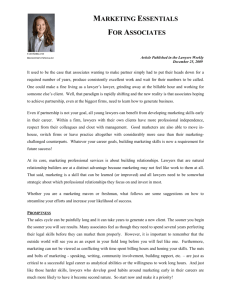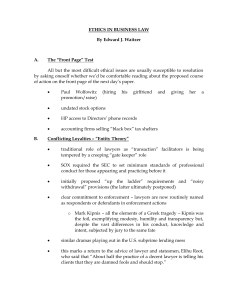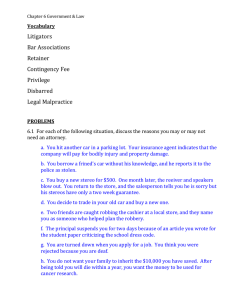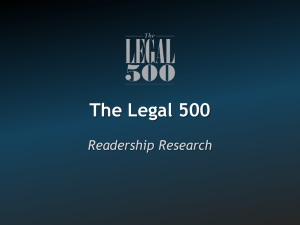THE PROFESSIONAL ETHICS COMMITTEE FOR THE STATE BAR OF TEXAS
advertisement
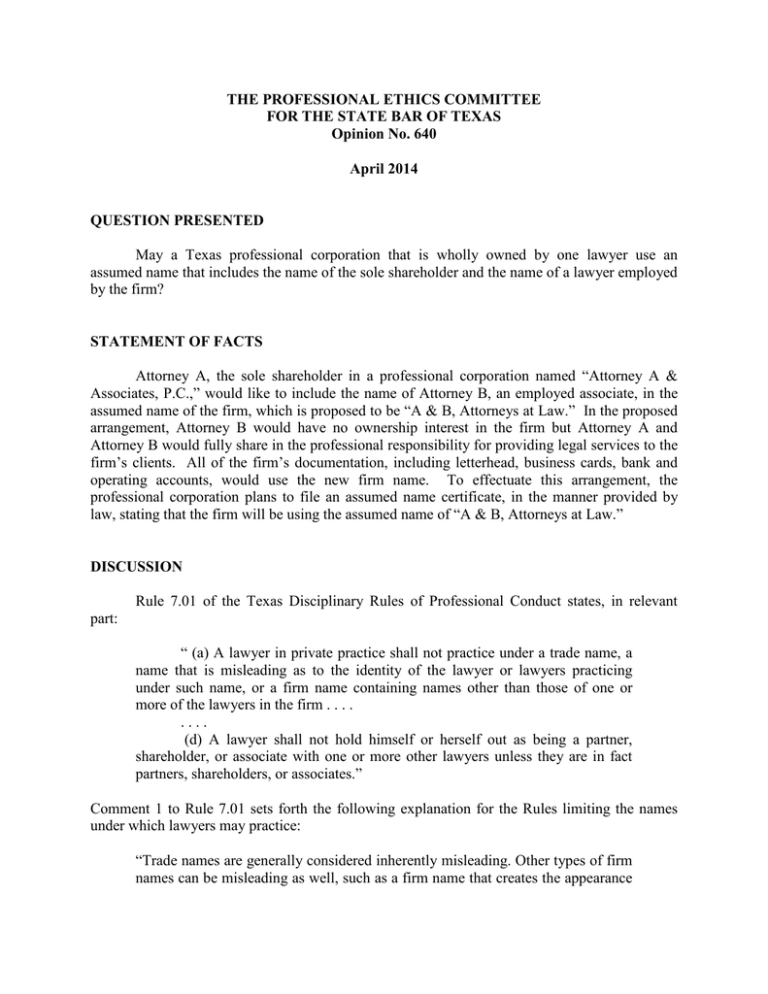
THE PROFESSIONAL ETHICS COMMITTEE FOR THE STATE BAR OF TEXAS Opinion No. 640 April 2014 QUESTION PRESENTED May a Texas professional corporation that is wholly owned by one lawyer use an assumed name that includes the name of the sole shareholder and the name of a lawyer employed by the firm? STATEMENT OF FACTS Attorney A, the sole shareholder in a professional corporation named “Attorney A & Associates, P.C.,” would like to include the name of Attorney B, an employed associate, in the assumed name of the firm, which is proposed to be “A & B, Attorneys at Law.” In the proposed arrangement, Attorney B would have no ownership interest in the firm but Attorney A and Attorney B would fully share in the professional responsibility for providing legal services to the firm’s clients. All of the firm’s documentation, including letterhead, business cards, bank and operating accounts, would use the new firm name. To effectuate this arrangement, the professional corporation plans to file an assumed name certificate, in the manner provided by law, stating that the firm will be using the assumed name of “A & B, Attorneys at Law.” DISCUSSION Rule 7.01 of the Texas Disciplinary Rules of Professional Conduct states, in relevant part: “ (a) A lawyer in private practice shall not practice under a trade name, a name that is misleading as to the identity of the lawyer or lawyers practicing under such name, or a firm name containing names other than those of one or more of the lawyers in the firm . . . . .... (d) A lawyer shall not hold himself or herself out as being a partner, shareholder, or associate with one or more other lawyers unless they are in fact partners, shareholders, or associates.” Comment 1 to Rule 7.01 sets forth the following explanation for the Rules limiting the names under which lawyers may practice: “Trade names are generally considered inherently misleading. Other types of firm names can be misleading as well, such as a firm name that creates the appearance that lawyers are partners or employees of a single law firm when in fact they are merely associated for the purpose of sharing expenses. In such cases, the lawyers involved may not denominate themselves in any manner suggesting such an ongoing professional relationship as, for example, “Smith and Jones” or “Smith and Jones Associates” or “Smith and Associates.” Such titles create the false impression that the lawyers named have assumed a joint professional responsibility for clients’ legal affairs.” The Disciplinary Rules do not define the term “trade name.” In Commission for Lawyer Discipline v C.R., 54 S.W.3d 506, 515 (Tex. App.-Fort Worth 2001, pet. denied), the court, in construing Rule 7.01, observed: “A trade name is a designation that is adopted and used by a person either to designate a good he markets, a service he renders, or a business he conducts.” Rule 7.01 is violated if lawyers who do not share joint responsibility within a firm for the representation of clients use a trade name that misleadingly indicates to the public that the lawyers have assumed joint professional responsibility for the firm’s legal services. See Professional Ethics Committee Opinion 478 (June 1991). In Opinion 529 (May 1999), this Committee recognized that the provisions of Rule 7.01 “allow a lawyer to practice under a firm name that contains names of one or more lawyers who practice, or have practiced, with the law firm together with words or symbols to indicate the nature of the organization or the fact that the firm provides legal services (rather than some other service or product).” In the circumstances here considered, the assumed name of “A & B, Attorneys at Law” proposed to be used by the professional corporation is not a trade name in violation of Rule 7.01 since the assumed name contains the names of the attorneys providing legal services as shareholder or associate of the professional corporation and the two attorneys whose names are included in the assumed name have joint professional responsibility for the firm’s legal services. CONCLUSION It is not a violation of the Texas Disciplinary Rules of Professional Conduct for a Texas professional corporation that is wholly owned by one lawyer to use an assumed name that includes the name of the sole shareholder and the name of a lawyer employed by the firm if the sole shareholder and the employee have joint professional responsibility for the professional corporation’s legal services.

